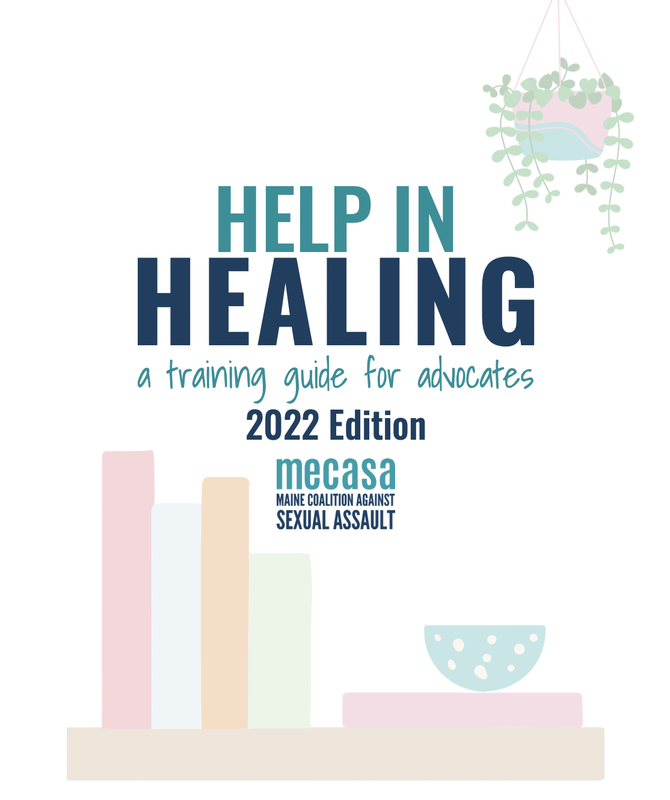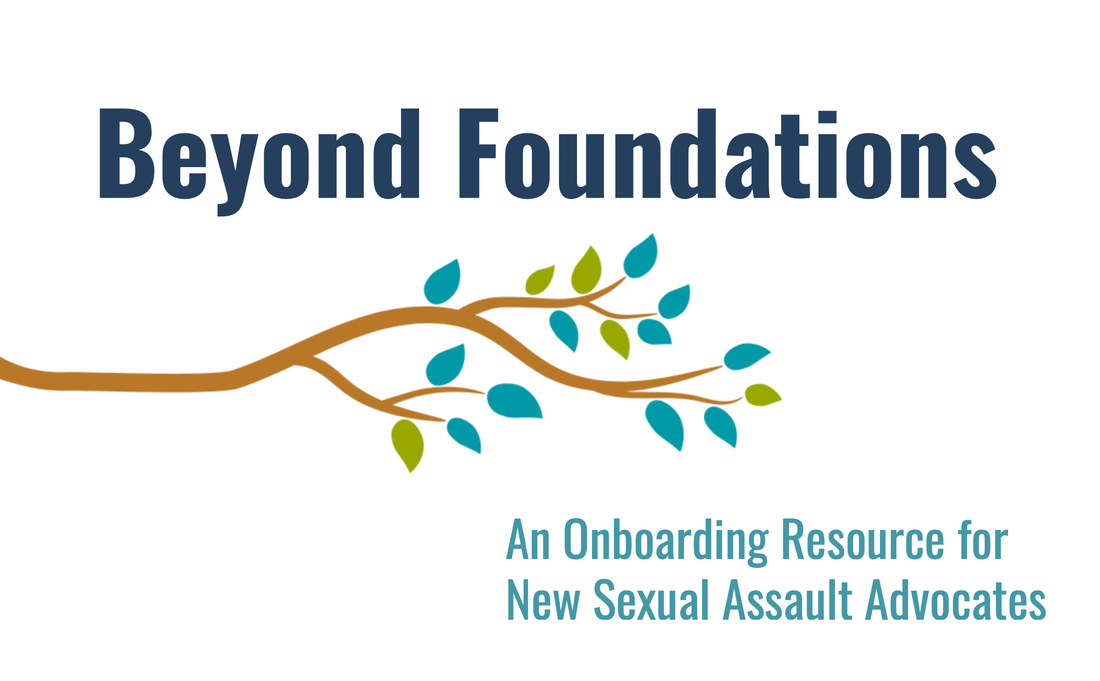Statewide Advocate Training Opportunities
One core purpose of developing standardized advocate training was to build the capacity of center staff. New staff, students (interns and work-study placed at the agency), and volunteers are welcome to take the training at any member center offering the Foundations of Advocacy and Help and Healing manual-based advocate training.
The goal of the shared advocate training calendar is to offer a predictable schedule of monthly advocate training to support new staff, interns, and volunteers throughout the state. This project is supported by the Statewide Advocate Training Workgroup, and centers have committed to doing their best to stick to the months they signed up for—knowing their own programs and staff/volunteers are a priority, and the schedule is subject to change. If/when the schedule does need to change, centers will contact Kayce to make the necessary updates.
Shared Advocate Training Schedule* (as of 5-14-24):
*The training location will be left to each agency and will depend on factors such as where participants are located and time of year (weather concerns, etc.). Participants' needs will be prioritized, and centers may include multiple ways for participants to attend, such as offering a Zoom option for in-person training.
The goal of the shared advocate training calendar is to offer a predictable schedule of monthly advocate training to support new staff, interns, and volunteers throughout the state. This project is supported by the Statewide Advocate Training Workgroup, and centers have committed to doing their best to stick to the months they signed up for—knowing their own programs and staff/volunteers are a priority, and the schedule is subject to change. If/when the schedule does need to change, centers will contact Kayce to make the necessary updates.
Shared Advocate Training Schedule* (as of 5-14-24):
- November/December: Sexual Assault Support Services of Midcoast Maine (SASSMM) Contact: Melissa Doyle
- January 2024: Rape Response Services (RRS) Contact: Amanda Chambers
- February 2024: TBD
- March 2024: Sexual Assault Response Services of Southern Maine (SARSSM) Contact Lynn Sterling
- April 2024: Sexual Assault Prevention and Response Services (SAPARS) Contact: Ashley Hayden or Jamie Demers
- May 2024: AMHC Sexual Assault Services (AMHC SAS) Contact: Wendy Page
- June 2024: Sexual Assault Crisis & Support Center (SAC&SC) Contact Kathleen Paradis or Deanna Walker
- June 11th - start at 3p, June 12th & 13th - 1p-5p, June 18th & 20th - 1p-5p. Please contact FMI.
- July 2024: Rape Response Services (RRS) Contact: Amanda Chambers
- July 16th-19th and July 23rd-26th from 11a-4p
- August 2024: AMHC Sexual Assault Services (AMHC SAS) Contact: Wendy Page
- September 2024: Sexual Assault Prevention and Response Services (SAPARS) Contact: Ashley Hayden or Jamie Demers
- October 2024: Sexual Assault Support Services of Midcoast Maine (SASSMM) Contact: Melissa Doyle
- November/December 2024: Sexual Assault Crisis & Support Center (SAC&SC) Contact Kathleen Paradis or Deanna Walker
*The training location will be left to each agency and will depend on factors such as where participants are located and time of year (weather concerns, etc.). Participants' needs will be prioritized, and centers may include multiple ways for participants to attend, such as offering a Zoom option for in-person training.
Advocate Training Curriculum & Facilitator's Guide
In 2020, sexual assault support centers statewide decided to use the national Foundations of Advocacy training as the core of our 40-hour Advocate Training. Collective use of the curriculum launched early 2021. Below are the current tools and materials, with more to come.
MECASA Core Competencies for Advocate Training
Advocate Training overview with Foundations Sections, Core Competencies, & Help in Healing reading
Foundations of Advocacy Training Manual
Foundations of Advocacy Sections share folder with PowerPoints, agenda, trainer outline, & materials
Evaluation share folder
MECASA Core Competencies for Advocate Training
Advocate Training overview with Foundations Sections, Core Competencies, & Help in Healing reading
Foundations of Advocacy Training Manual
Foundations of Advocacy Sections share folder with PowerPoints, agenda, trainer outline, & materials
Evaluation share folder
Help in Healing: A Training Guide for Advocates
The Help in Healing manual has been the foundation for Advocate Training across Maine for decades. It holds the philosophy, history, and practice of advocacy for survivors of sexual violence and their loved ones. In 2021, the Advocate Training workgroup embarked on a thorough update and edit of the 2013 Help in Healing, including incorporating some of our favorite content and language from the Foundations of Advocacy curriculum.
|
Help in Healing – A Training Guide for Advocates, 2022 Edition
And if you're printing in-house, here is the cover. Here is the complete Help in Healing manual. |
Beyond Foundations: An Onboarding Resource for Sexual Assault Advocates
Beyond Foundations: An Onboarding Resource for New Sexual Assault Advocates was once part of the original Help in Healing manual. When updating Help in Healing in 2021, it was determined that some of the content was more appropriate for onboarding new center staff rather than be included in the initial foundational 40-hour training.
Below there are approximately 45 hours of recorded training, 100 pages of Beyond Foundations reading, and many hours of website and document review. It is intended to be done over the first 9 months of employment in addition to the 40-hour Foundations of Advocacy Training.
Depending on the staff member’s support, role, and experience onboarding may happen after or parallel to the 40-hour Foundations of Advocacy Training. To ensure privilege and quality services for survivors, advocates should not work with survivors until the Foundational training is complete.
Below there are approximately 45 hours of recorded training, 100 pages of Beyond Foundations reading, and many hours of website and document review. It is intended to be done over the first 9 months of employment in addition to the 40-hour Foundations of Advocacy Training.
Depending on the staff member’s support, role, and experience onboarding may happen after or parallel to the 40-hour Foundations of Advocacy Training. To ensure privilege and quality services for survivors, advocates should not work with survivors until the Foundational training is complete.
|
Beyond Foundations Reading
And if you're printing in house, here is the cover and table of contents. |
Beyond Foundations Recommended Onboarding Content
(all saved in the same document here, listed below for context)
|
Helpline Pilot Materials for Advocate Training
- Helpline Restructuring Pilot Training Recording
- Here are instructions on how to access this training.
- Helpline Restructuring Pilot Training Guide
- Helpline Restructuring Pilot Training Presentation (editable)
- Helpline Database Training Video
- The Helpline Call Decision & Response Tree
- Managing Challenging Calls Guidance
- Non-urgent Referral Form (off-line version)
Statewide Advocate Training (AT) Workgroup
Workgroup Overview
Meeting Notes
'On Your Own' Advocate Training Ideas From Centers
Workgroup Overview
Meeting Notes
'On Your Own' Advocate Training Ideas From Centers
Looking for the Maine Coalition Against Sexual Assault? Head to mecasa.org. |



